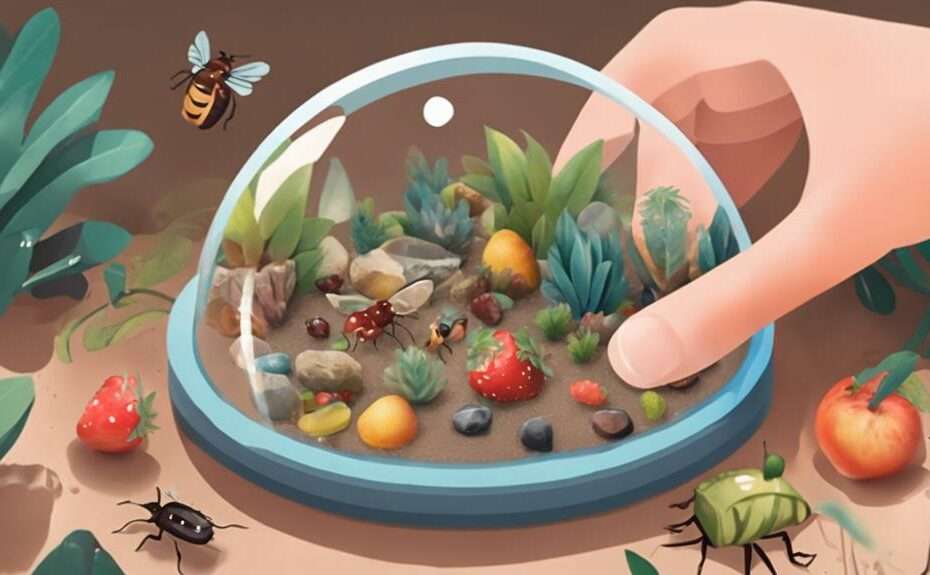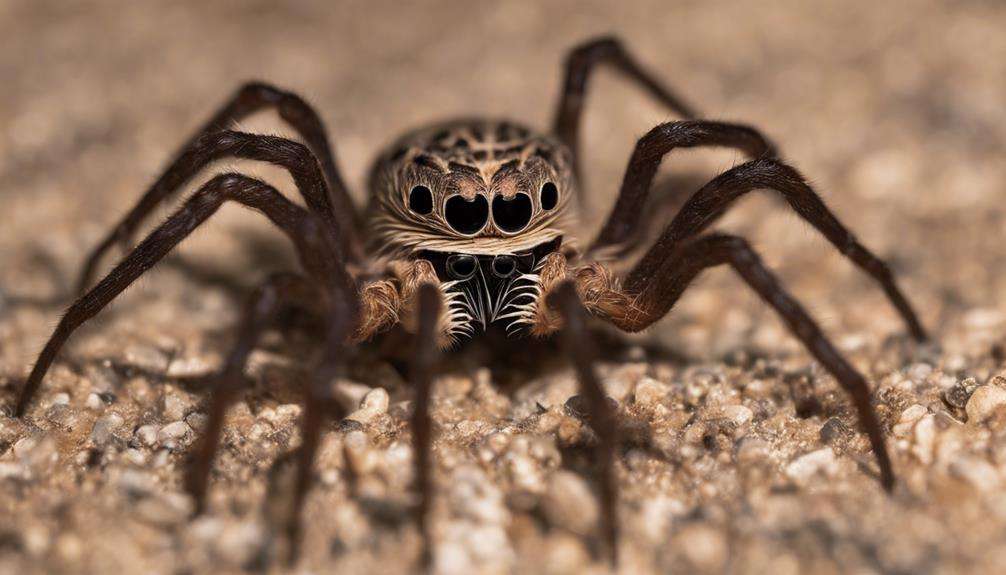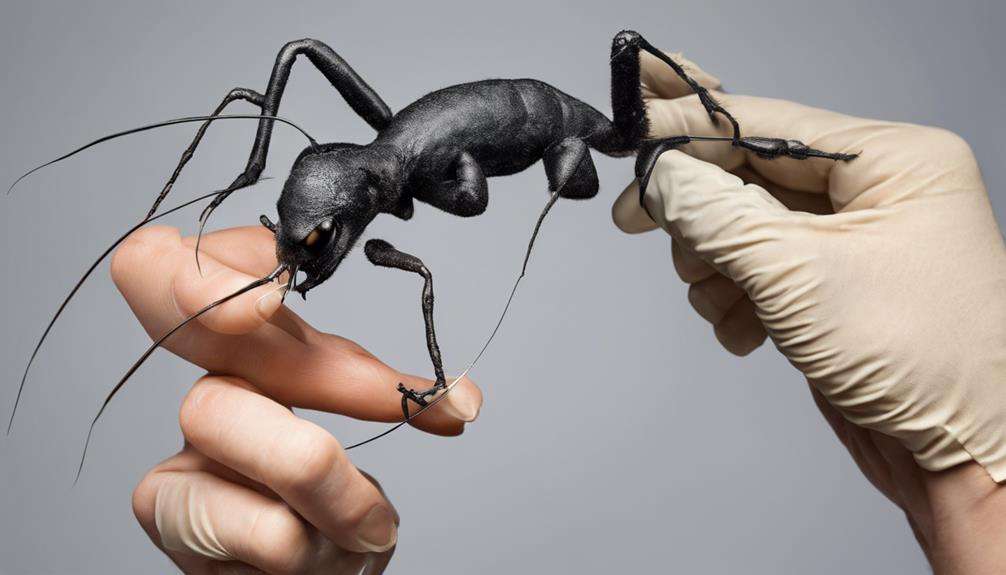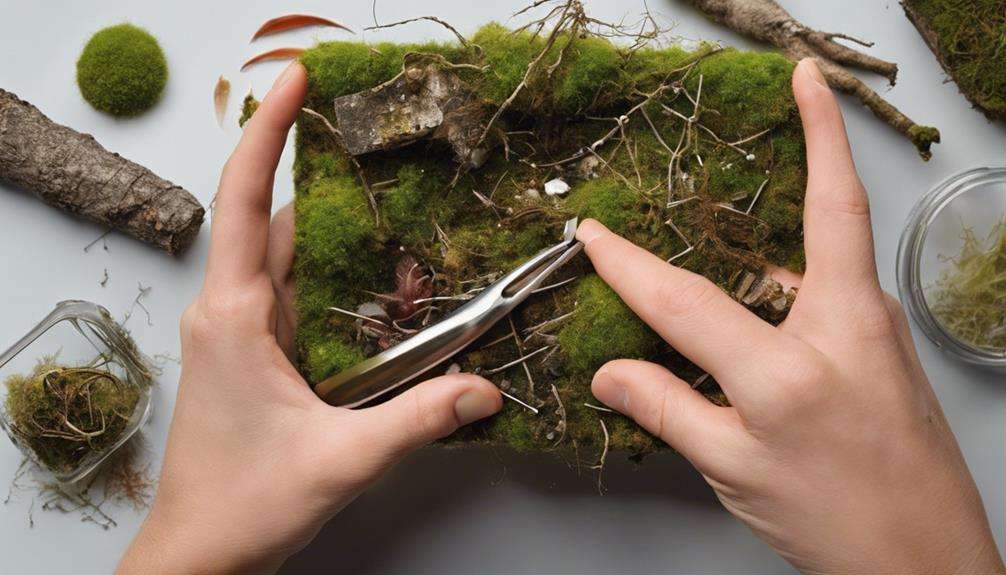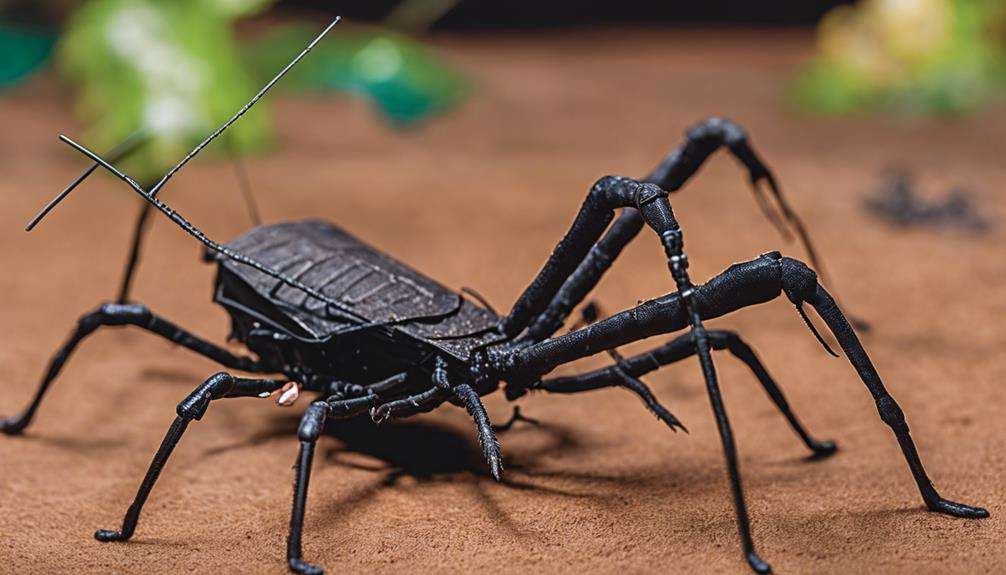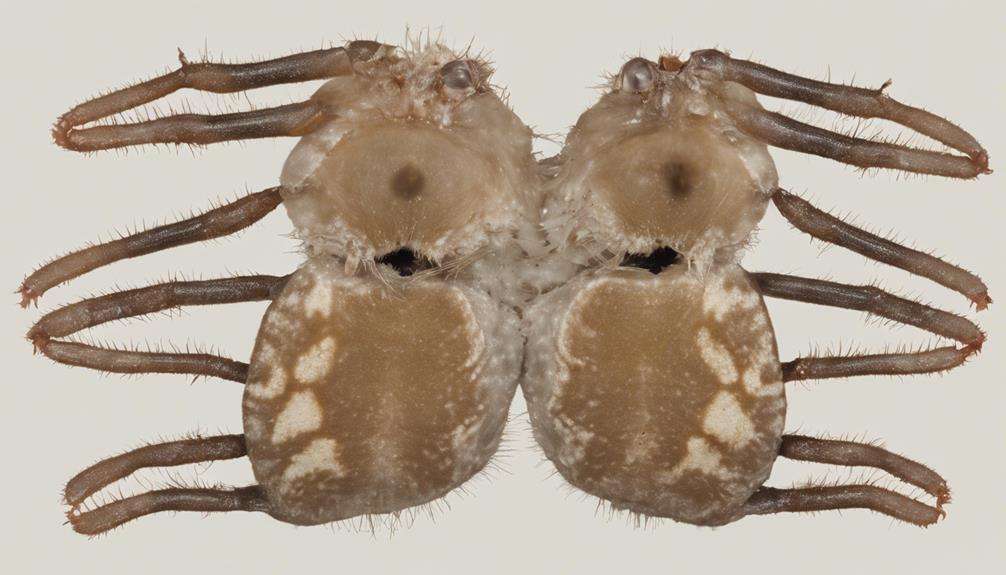If you thought pseudoscorpions were solely predators, think again. Did you know that some species engage in a curious behavior known as phoresy, where they catch a ride on other insects for transportation?
This intriguing fact sets the stage for exploring uncommon tips that can elevate your pseudoscorpion pet care to the next level. From diet diversification to creating a habitat that mirrors their natural surroundings, these strategies might just surprise you with their impact on your tiny arachnid companion's well-being.
Key Takeaways
- Offer a diverse insect diet to mimic natural feeding behaviors.
- Use a soft brush for gentle handling to reduce stress.
- Monitor breeding behaviors and provide optimal conditions for mating.
- Maintain a clean and stress-free environment to support overall well-being.
Housing Requirements
To ensure the well-being of your pseudoscorpion pet, it's essential to create a suitable habitat that meets their housing requirements. Pseudoscorpions thrive in small, securely lidded containers with ventilation holes to maintain proper airflow. Adding substrate like soil, leaf litter, or bark is crucial as it mimics their natural environment and provides a comfortable space for them to burrow and hide.
Ensure the enclosure is escape-proof as these tiny creatures are adept at squeezing through the tiniest openings. Providing hiding spots such as small caves or crevices will help your pseudoscorpion feel secure and exhibit their natural behaviors without stress. Remember to regularly clean the enclosure, removing any waste or uneaten food to maintain a hygienic environment for your pet.
Feeding Schedule
To ensure your pseudoscorpion thrives, feeding them small bugs like ants every 2-3 days is crucial. Offering a variety of prey items can help meet their nutritional needs and promote a balanced diet.
Monitoring their feeding response and adjusting the schedule based on individual appetite and activity levels is key to maintaining their health and well-being.
Daily Feeding Requirements
Establishing a consistent feeding schedule is essential for meeting the daily nutritional requirements of your pseudoscorpion pet. Pseudoscorpions, like ants, need daily feedings to stay healthy.
Monitor their food intake closely to ensure they're receiving enough nutrients. Adjust the amount of food based on factors like their size, activity level, and growth stage. By providing a steady supply of small bugs, you can help maintain your pseudoscorpion's health and well-being.
Variety in Diet
For optimal health and nutrition, ensure your pseudoscorpion's diet includes a variety of small bugs like ants, booklice, and mites on a consistent feeding schedule. Providing a balanced and varied diet is crucial for their well-being. Here are some tips to help you achieve this:
- Nutritional Balance: Different prey items offer a range of nutrients essential for your pseudoscorpion's health.
- Prey Selection: Offering various insects replicates their natural diet, supporting overall health.
- Dietary Variety: A diverse diet promotes better health and longevity for your pet.
- Health Benefits: Different prey items contribute to a well-rounded nutritional intake.
- Mealtime Excitement: Changing up their diet creates foraging opportunities and keeps mealtime interesting.
Ensuring a variety of prey in their diet will benefit your pseudoscorpion's health and happiness.
Monitoring Food Intake
To ensure your pseudoscorpion thrives, consistently monitor their food intake with a well-structured feeding schedule. Pay attention to their feeding habits, as these tiny creatures have specific nutritional needs.
Offer small bugs like ants regularly, observing their appetite and adjusting portion control accordingly for weight management. Keep an eye on their food preferences and ensure they're actively hunting and eating.
By monitoring their feeding behavior, you can gauge their activity level and overall health. If you notice any changes in appetite or weight, consult a veterinarian or exotic pet expert for guidance on maintaining a balanced diet.
Your pseudoscorpion's well-being depends on your attentive care and understanding of their unique dietary requirements.
Handling and Interaction
When handling your pseudoscorpion, remember to be cautious around their pedipalps to prevent accidental stings. Using a soft brush or tool can help guide them gently without causing harm.
Encouraging them to crawl onto your hand voluntarily can reduce stress and promote natural behaviors during interaction.
Safe Handling Techniques
Using gentle movements when interacting with pseudoscorpions is essential to prevent stress and accidental harm. Remember these key points for safe handling:
- Pincer precautions: Avoid touching their pincers directly to prevent accidental harm.
- Gentle coaxing: Use a small paintbrush or soft bristle brush to gently coax them onto your hand for stress-free interaction.
- Stress-free interaction: Allow pseudoscorpions to walk on your hand without squeezing or pinching them.
- Hand hygiene: Always wash your hands before and after handling pseudoscorpions to maintain cleanliness.
- Gentle movements: Use soft, gentle movements when handling pseudoscorpions to keep them comfortable and safe.
Encouraging Natural Behaviors
Encourage pseudoscorpions to engage in their natural behaviors by providing a stimulating environment that mimics their wild habitat. To promote foraging enrichment, scatter prey items strategically in their enclosure.
Incorporate hideout designs using natural materials like cork bark or small rocks for them to explore and seek shelter. Stimulating activities such as creating an obstacle course using safe objects can encourage their hunting and exploring instincts.
Limit handling to reduce stress and allow them to feel secure, enabling them to exhibit their natural behaviors undisturbed. Establish a bioactive environment with live plants and beneficial microorganisms to enhance their surroundings and promote natural interactions.
Enrichment Activities
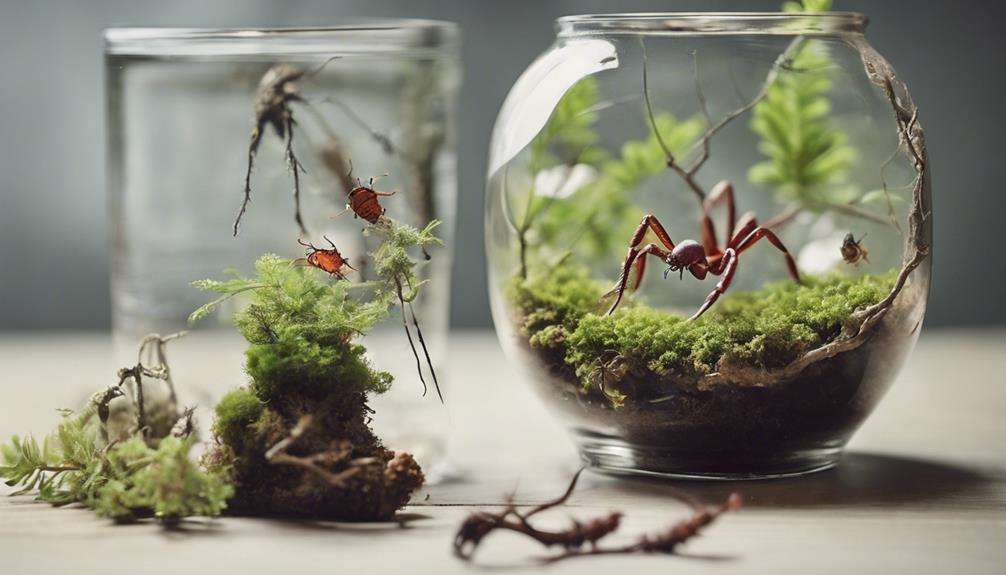
To provide optimal mental and physical stimulation for your pseudoscorpion, consider incorporating a variety of enrichment activities into their habitat. Here are some enriching activities to keep your pseudoscorpion happy and healthy:
- Climbing challenges: Provide small objects like twigs or rocks for your pseudoscorpion to climb on. This mimics their natural habitat and gives them opportunities to exercise and explore.
- Foraging fun: Offer live prey such as small insects for your pseudoscorpion to hunt. This engages their hunting instincts and provides mental stimulation.
- Burrowing bliss: Create a small digging area with soft substrate like peat moss or coconut fiber. Pseudoscorpions enjoy burrowing, and this activity can help keep them active and entertained.
- Rotate hiding spots: Change the layout of their habitat regularly to introduce new hiding spots and shelters. This prevents boredom and encourages exploration.
- Sensory enrichment: Introduce safe plants or fake foliage for your pseudoscorpion to explore. This can provide sensory stimulation and create a more natural environment for them.
Health and Wellness Checks
For the optimal care of your pseudoscorpion, ensuring regular health and wellness checks is essential. Regular check-ups are crucial to spot any signs of illness or injury early on. Take the time to inspect your pseudoscorpion for any abnormal behavior, like lethargy or changes in eating habits. By monitoring their feeding patterns and providing a well-balanced diet, you can help prevent many health issues. Additionally, maintaining a suitable habitat with the right temperature, humidity levels, and substrate is key to supporting your pseudoscorpion's overall well-being.
If you notice any concerning changes in your pseudoscorpion's health, don't hesitate to seek veterinary care from an exotic animal specialist. Early detection is vital for effective treatment. Alongside physical health, it's important to prevent stress by minimizing handling and offering hiding spots in their enclosure for privacy and comfort. By being proactive in health and wellness checks, you can ensure a happy and healthy life for your pseudoscorpion.
Potential Behavioral Issues
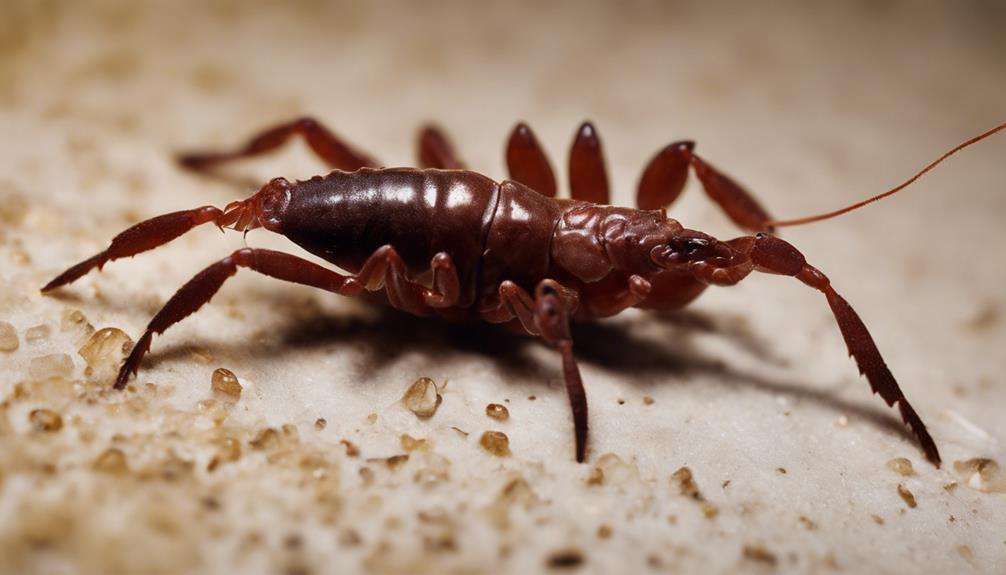
Behavioral issues may manifest in pseudoscorpions due to factors such as improper handling or unsuitable environmental conditions. If you notice signs of stress or behavioral problems in your pet pseudoscorpion, it's essential to address these issues promptly.
Here are some tips to help you manage potential behavioral issues:
- Stress Management: Pseudoscorpions may exhibit stress behaviors like hiding excessively or becoming aggressive. Implement strategies to reduce stress levels in your pet.
- Environmental Enrichment: Providing a suitable habitat with hiding spots and proper temperature gradients can help address behavioral issues. Enrich their environment to promote natural behaviors.
- Behavioral Observation: Watch for signs of decreased activity, abnormal posture, or lack of appetite. Regularly monitoring your pseudoscorpion's behavior can help you identify issues early.
- Intervention Strategies: Consult with a veterinarian or experienced exotic pet keeper for guidance on managing behavioral challenges. They can provide tailored solutions and advice.
- Behavioral Training: Consider behavioral modification techniques to encourage positive behaviors in your pseudoscorpion. Training can strengthen your bond and improve their well-being.
Breeding Considerations
Breeding pseudoscorpions involves understanding their reproductive behavior and environmental requirements to ensure successful mating outcomes. Mating behaviors in pseudoscorpions are fascinating; males produce sperm packets known as spermatophores, which they transfer to females for fertilization. Female pseudoscorpions have the unique ability to store sperm from multiple matings, enhancing their reproductive success by increasing the chances of successful fertilization.
To maximize breeding success, it's crucial to create an environment that mimics their natural habitat. Temperature and humidity levels play a significant role in the breeding process, as these factors can influence the mating behaviors of pseudoscorpions. Providing the right conditions can encourage courtship rituals and facilitate successful mating.
Genetic diversity is essential for the health and vitality of pseudoscorpion populations. Through controlled breeding programs, individuals can be selectively paired to maintain genetic diversity and prevent inbreeding, ensuring the long-term sustainability of these fascinating creatures in captivity. By understanding and addressing these breeding considerations, you can help contribute to the conservation of pseudoscorpions while enjoying the wonders of their unique reproductive behaviors.
Frequently Asked Questions
Are Pseudoscorpions Good Pets?
Pseudoscorpions can be good pets for experienced arachnid enthusiasts. Understanding pseudoscorpion behavior, providing a suitable habitat, and using gentle handling techniques are crucial. Their unique care needs make them a rewarding but challenging choice.
What Do You Feed Pseudoscorpions?
To keep your pseudoscorpion healthy, offer a varied diet of small insects like ants and booklice. Feed them every few days, ensuring they get the nutrients they need. Consider adding nutritional supplements for optimal health and use feeding techniques that suit their preferences.
What Attracts Pseudoscorpions?
To attract pseudoscorpions, create a welcoming environment filled with tasty treats like small insects and mites. Ensure cozy shelters such as leaf litter or bark and keep the humidity high. Make your space a paradise for these tiny hunters!
Are Pseudoscorpions Aggressive?
When handling pseudoscorpions, remember their timid social behavior. They rarely display aggression unless provoked. Gentle care reduces aggression triggers. By treating them calmly, you create a safe environment for these fascinating creatures in your care.
Conclusion
As you navigate the intricate world of caring for pseudoscorpions, remember to create a haven that echoes their natural environment, like a miniature forest teeming with life.
By offering a diverse menu and hiding spots for comfort, you're crafting a sanctuary where these tiny arachnids can thrive and explore.
Keep a watchful eye on their well-being and engage them in enriching activities to foster a bond that transcends the boundaries of the terrarium.
Happy pet keeping!
